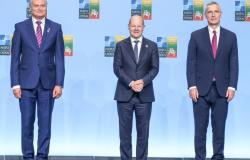
In Europe, especially in the Central Eastern Europe (CEE) region, the rules of the foreign direct investment (FDI) game are changing. Due to competitive aggressive actions and the problems of the Lithuanian economy, we are losing positions in the fight for investments, warns the FDI development agency “Invest in Lithuania”.
The analysis prepared by experts shows that we are increasingly inferior to the regional leaders in terms of competitiveness, and if we do not take appropriate actions, economic growth will also stagnate.
“In terms of labor costs, we are no longer cheap,” Elijus Čivilis, head of Invest in Lithuania, said at a press conference on Wednesday, pointing out that Lithuania now has to respond to new challenges.
He was seconded by Marius Stasiukaitis, head of the strategy of “Invest in Lithuania”, indicating that all other countries in the region can offer the same “low” costs, and compared to the countries of Southern Europe, this advantage of Lithuania is also rapidly diminishing.
At current rates, even in 2050 we will not come close to the productivity level of the Nordic countries. “What is needed is for productivity to grow twice as fast as it has been so far,” says M. Stasiukaitis, adding that at the current growth rate, in the best case scenario, we would only reach 60% in 25 years. Nordic level.
However, in the case of the ambitious scenario, Lithuania’s GDP in 2050 could be 89 billion EUR higher than the current rate of growth, “Investuok Lithuania” calculates.
Investments in Central Europe are record high, but Lithuania has started to lag behind
The FDI market is shrinking all over the world, with the only exception being the CEE region, where results are at historic highs, according to data from international analysts. Although Lithuania is still ahead of the other Baltic countries, we are losing a lot of ground in the international FDI field.
“We see that global FDI is shrinking, but the situation is opposite in those countries with which we compete directly – Poland, Hungary, Romania. In recent years, the governments of these countries have been throwing enormous financial resources at the promotion of FDI. The fight is getting more intense as the pace of the competitors only increases. We have to solve this issue now if we don’t want to remain on the edge of investments, especially in such a changed geopolitical environment”, emphasizes E. Čivilis.
Žygimantas Gedvilas/BNS photo/Elijus Čivilis
According to him, challenges in attracting investments are a serious alarm signal due to the decreasing competitiveness of the country, but local industry, our regions, high-tech sectors, green economy are also facing challenges.
Competition is growing not only in this region – competition is intensifying not only between EU countries, but also between continents. Especially in recent years, the USA has strengthened, and the list of aggressive players “is getting longer and longer”. Germany seeks to attract strategic investments in the field of high-tech industry, and allocates huge state support for this. France, Israel, and Spain are following a similar path.
“What our competitors are doing in the Central European region is extremely important to us. The biggest winner is Hungary”, says M. Stasiukaitis. Hungary recently approved nearly 2.4 billion EUR support for green energy investments.
Offers more focus on robotics and high technology
The future prospects of already operating manufacturing companies are extremely important for the country’s development, so it is important to promote the transformation of Lithuanian manufacturing as much as possible, states “Invest in Lithuania”.
The Authority suggests taking the following steps.
- To establish a corporate transformation fund within Invega, which would specialize in business consolidation, mergers or buyouts from existing shareholders and implement corporate transformation;
- to provide consistent financing (subsidies or soft loans) for the implementation of robotization solutions in manufacturing companies – data show that the rate of domestic companies investing in industrial robots is from 2.4 percent. in 2018 rose to 3.1 percent. in 2022;
- to expand the availability of consulting services by subsidizing part of the costs of preparing robotization plans and expert consultations;
- improve the compliance of retraining measures with the needs of industrial enterprises and expand the conditions for working persons to use retraining opportunities;
- to implement the bioeconomy strategy so that Lithuania is not an exporter of raw materials, but of high added value products – by 2020. according to the data, according to the productivity of the bioeconomy sector, we lag behind not only the leading countries of Denmark, the Netherlands and Finland, but also the EU average;
- to use relations with other countries of the region for faster export growth through co-financing, synergies of priority sectors and better visibility in the market.
As explained by M.Stasiukaitis, the strategy manager of “Invest in Lithuania”, our country’s competitiveness model was based on low costs for a long time – we attracted investments to a large extent with the promise of cheaper labor. However, such a strategy is becoming less and less effective and sustainable today.
According to the strategy manager of “Invest in Lithuania”, in order to change the worrying trends, Lithuania needs a strategic approach and decisive decisions. If we really want 2050 to live like the Scandinavians, we must increase our productivity by at least 3.8 percent. per year, when in the last decade it reaches only 2 percent. According to him, only by increasing this indicator will we be able to guarantee a high income and quality of life for the population.
“Our competitive advantages must be based on innovation, advanced operational practices and high productivity. Here we need a balance between high-tech development in big cities and industrial development in the regions. The eyes are especially hungry for not using their potential. Some of the regions, in terms of average gross domestic product (GDP) per capita, are more than 2 times behind Vilnius, and more than 5 times behind the level of Denmark. To achieve a breakthrough in our regions, good wishes will not be enough, for this we need much more investments in advanced production”, says M. Stasiukaitis.
In order to attract more players to the regions, “Investuok Lithuania” suggests strengthening regional specialization and attracting cluster investment companies. Also, more subsidy measures should be allocated and industrial infrastructure projects should be further developed effectively.
Action is needed now, experts say
Rūta Skyrienė, the head of the association “Investuotųi forumas”, also speaks about the need to make serious, long-term perspective-oriented decisions. According to her, Lithuania must ask itself a very important question: how can we distinguish ourselves from other countries in the region? What can be our competitive advantage?
“I will not say anything new – we are a small nation, so we can only compete with our knowledge, competences, talents, or otherwise – quality. In the modern world, it is created with science, innovative products and services, robotics and automation solutions. We have enough examples to prove that we have a lot of potential here. The fundamental question is, are we doing enough to properly expose and realize it? Today, the answer would be negative,” she says.
The fact that Lithuania needs to pay more attention to the development of high technologies is also confirmed by the numbers. in 2021 productivity in these sectors was around 67 percent. higher than in others. Salaries in such workplaces are also well above the national average. Unfortunately, this reserve remains unused. Share of employees in high-tech sectors in Lithuania in 2022 was just 4.6 percent. – In Estonia, the share of such employees was almost one and a half times higher.
“In the national progress plan, we have even provided for priority sectors – ICT, life sciences, engineering industry – which are increasingly competing for quality and competencies. Their cultivation is the only sustainable way for Lithuania. The country’s development trajectory can only be accelerated by access to the latest competences and technologies, new workplaces, paid taxes and high salaries”, says Giedrius Dzekunskas, head of the Lithuanian branch of Danske Bank and chairman of the board of Invest in Lithuania.
Tags: Lithuanias competitiveness weakening years lost investors billion euros Business
-




